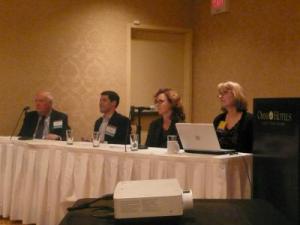By Karen A. Frenkel
Panelists tackling solutions to the collapse of science literacy and the collapse of science journalism differed radically on how to get the public interested in science and reading about it.
Co-moderator and new NASW President* Nancy Shute kicked off the discussion by citing "depressing numbers" reflecting peoples' knowledge of science, like what an experiment is, or what a placebo is. Though excited that DNA no longer has to be described to many, they did not seem to know much else, she said. Given the level of knowledge, and that news online is linked to hits, she asked whether science could "sneak into the matrix," and answered her own question by saying "No."Carolyn L. Funk, Associate Professor and Director of the Commonwealth Poll, Virginia Commonwealth University, who consults for the NSF, said that the public barely distinguishes between science and pseudo science. She favored stressing the practical ways that science affects everyday life, like the chemistry of cooking or GPS.
But Chris Mooney, author of Unscientific America: How Scientific Illiteracy Threatens our Future, said the public is somewhat engaged and cited the uproar over the demotion of Pluto from planet status. On the other hand, half of Americans don't accept the theory of evolution. He suggested that mass entertainment and Hollywood have helped increase scientific literacy, but not enough. He said pairing scientists with rock stars like Joe Perry works.
Jon Miller, Director of the Center for Science Literacy at the University of Michigan, said that if people don’t know what an atom or molecule is, they won’t understand nanotechnology, so he advocated improving science education at all levels, especially secondary. On a positive note, Gen X is the most scientifically literate generation ever, he said. Gen Xers surf and are selective about what they read online. He did not think the Pluto issue was a serious one. We have to think in terms of how the Internet has changed everything "because we are a just-in-time world."
As for solutions involving science writing, Mooney said scientific organizations are rethinking how best to communicate with the public. Another approach, emphasizing the human interest side of science came from the audience. Miller said it couldn't counteract attitudes about science resulting from cases of scientific fraud and doctors who are engaged in drug clinical trials and yet take money from pharmaceuticals.Co-moderator Rick Borchelt asked each how they would use one dollar to fix the problem. Miller said 50 cents for pre-college education, 25 to improve college courses (because we're failing worst there), and the rest for adult learning of all kinds. Mooney called for the government to subsidize careers in science communication for journalists and young scientists who did not get tenure.
Funk said she would put the money into the education system, especially standards for science learning, which is being eclipsed by math and reading standards.




